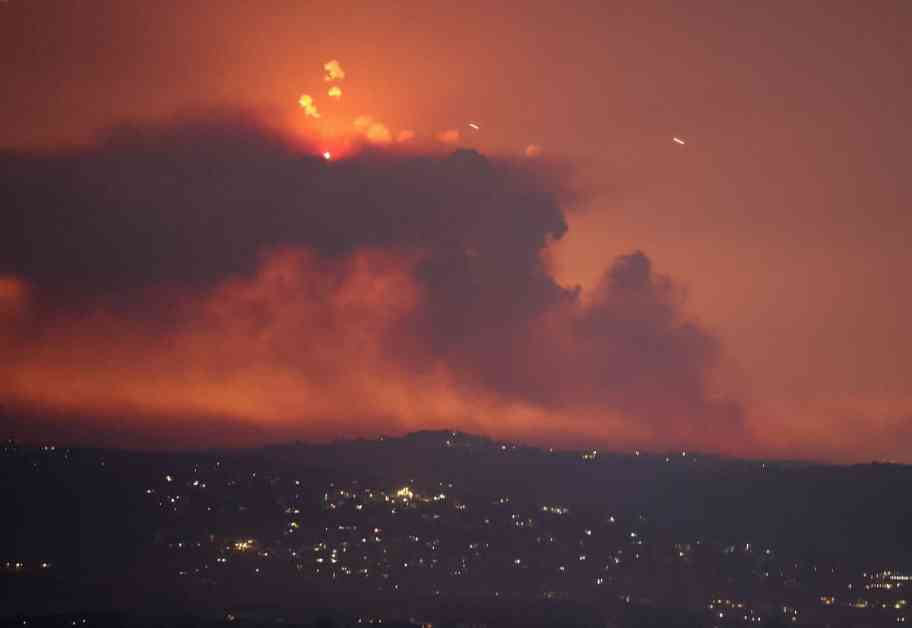Israel Launches Pre-Emptive Strikes on Hezbollah in Lebanon: A Deep Dive into the Escalating Conflict
In a significant escalation of tensions in the Middle East, Israel has launched pre-emptive strikes on Hezbollah targets in Lebanon. The Israeli military claimed that Hezbollah was preparing for a “significant assault”, prompting the airstrikes on Sunday. Hezbollah, in turn, retaliated by launching a barrage of drones and rockets towards Israel in response to the killing of one of its top commanders last month.
Israel’s Pre-Emptive Strikes:
The Israeli military conducted strikes against Hezbollah targets in Lebanon, citing intelligence that the group was planning a major offensive. The strikes were aimed at disrupting Hezbollah’s rocket launch capabilities in southern Lebanon, with approximately 100 Israeli Air Force fighter jets targeting thousands of Hezbollah rocket launcher barrels.
The military stated that most of the rocket launchers were aimed towards northern Israel, posing a direct threat to civilian populations. While initial assessments reported minimal damage in Israel from Hezbollah’s retaliatory operation, the military remained on high alert to defend against further attacks.
Hezbollah’s Retaliation:
Hezbollah retaliated swiftly to Israel’s pre-emptive strikes by launching a barrage of over 320 Katyusha rockets and deploying numerous drones into Israeli airspace. The group claimed to have hit 11 military targets, including bases, barracks, and positions in northern Israel and the Golan Heights.
In a statement, Hezbollah announced that their operation was in response to the assassination of one of its high-ranking commanders in a Beirut suburb. The group emphasized that the first phase of their retaliation had been completed, hinting at further attacks in the future.
International Concerns and Calls for De-Escalation:
The United Kingdom expressed deep concern over the escalating hostilities between Israel and Hezbollah, emphasizing the need to avoid a major regional war. UK Cabinet Minister Pat McFadden urged all parties to exercise restraint and work towards de-escalating the situation to prevent further violence and instability in the region.
US Defense Secretary Lloyd Austin reaffirmed the United States’ commitment to Israel’s defense against any attacks by Iran and its regional proxies. Diplomatic efforts from the US and European countries have been underway to mitigate the escalating conflict and prevent a larger regional war from erupting.
Hezbollah Leader’s Address and Ceasefire Talks:
Hezbollah’s leader, Sayyed Hassan Nasrallah, is scheduled to make a televised address to discuss the latest developments in the conflict. The group’s intentions and future actions are expected to be clarified in Nasrallah’s statement, providing insight into Hezbollah’s strategy moving forward.
Despite the ongoing hostilities, Israel has indicated its willingness to participate in ceasefire talks on Sunday. The talks, hosted by Egypt, aim to bring an end to the violence between Israel and Hamas in Gaza. Hezbollah has expressed a willingness to cease fighting if a ceasefire agreement is reached, highlighting the interconnected nature of conflicts in the region.
Royal Jordanian’s Flight Suspension and Continued Tensions:
Royal Jordanian Airlines suspended flights to Beirut amidst the escalating conflict between Israel and Hezbollah. The decision was made due to the current situation, reflecting the widespread impact of the hostilities on regional air travel and security concerns.
Although the exchange of fire between Israel and Hezbollah appeared to have subsided by mid-morning, tensions remained high as both sides remained on alert. The full extent of casualties and damage from the conflict was yet to be determined, underscoring the volatile nature of the situation and the potential for further escalation.
Conclusion:
The conflict between Israel and Hezbollah has escalated rapidly, with both sides engaging in retaliatory strikes and provocative actions. The international community has expressed deep concerns over the potential for a major regional war and has called for restraint and de-escalation to prevent further violence and instability.
As the situation continues to unfold, diplomatic efforts and ceasefire talks are crucial in finding a peaceful resolution to the conflict and preventing further loss of life and destruction in the region. The actions and statements of key leaders, including Hezbollah’s Nasrallah and Israel’s defense minister, will shape the trajectory of the conflict and determine the prospects for a lasting ceasefire and peace in the Middle East.












